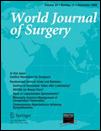Surgical Factors Influencing Outcomes in Patients Resected for Cancer of the Esophagus or Gastric Cardia
Abstract
Background
Surgery is the treatment of choice for localized esophageal and gastric cardia cancer. Our aim was to evaluate factors influencing postoperative short-term morbidity, 30-day mortality, and long-term prognosis.
Methods
We identified 232 patients who had undergone surgical resection from a Swedish nationwide case control study of cancer of the esophagus and cardia between December 1, 1994 and December 31, 1997. Patients’ demographics, tumor characteristics, preoperative investigations, and treatments were reviewed. Patients were followed up through linkage to the Death Registry until December 2004. Survival curves were estimated by the Kaplan-Meier method. Cox proportional hazards regression models were used to derive hazard ratios (HRs) with 95% confidence intervals (CIs).
Results
The overall 5-year survival rate was 25%. Tumor stage was the most prominent prognostic factor for long-term survival. Low-volume hospital (HR = 1.3, 95% CI = 1.0–1.9), low-volume surgeon (HR = 1.4, 95% CI = 1.0-2.0), and postoperative need for respirator support (HR = 1.4, 95% CI = 1.0–1.9), were associated with a worse prognosis. Patients treated at low-volume hospitals or by low-volume surgeons needed respirator support more often or stayed longer at intensive care units after surgery.
Conclusion
Patients with esophageal cancer have a modestly poorer prognosis when operated on at low-volume centers or by surgeons with less experience with esophageal cancer surgery.




